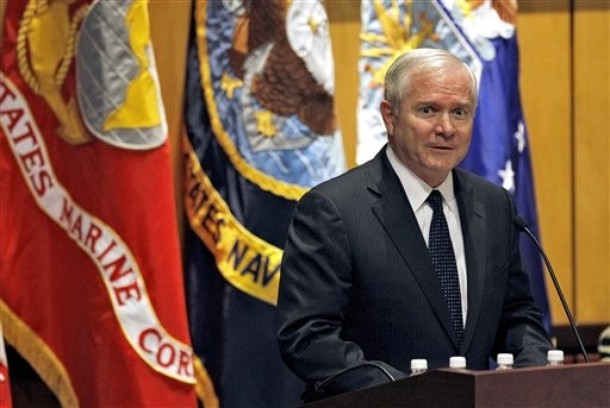
From Craig Whitlock, the Washington Post: Of all the spending cuts and budget battles the Pentagon is confronting, none is causing more angst than Defense Secretary Robert M. Gates‘s vow to start getting rid of generals and admirals.
By almost any measure, the military is more top-heavy an institution than it has been for decades. Today, there are 40 four-star generals and admirals — one more than in 1971, during the Vietnam War, even though the number of active-duty troops has shrunk by almost half.
The number of active-duty generals and admirals of all rank, meanwhile, has increased by about 13 percent since 1996.
It is, as Gates puts it, "brass creep."
But the defense secretary’s pledge Monday to cut about 5 percent of the brass is nothing short of seismic for many at the Pentagon. The cuts would be the largest in the upper ranks since a similar squeeze at the end of the Cold War, when the collapse of the Soviet Union prompted the military to downsize. …
He has told aides that they have until Nov. 1 to come up with a list of at least 50 other brass jobs that will get the ax. Officials said that most of the positions probably will be eliminated by attrition.
Among the likely targets are officers in Europe. U.S military and NATO forces in Europe are jointly led by a four-star commander. In a vestige of World War II, however, the Army, Navy and Air Force have four-star officers overseeing their individual forces in Europe as well.
"The ranks of the major commands there have remained intact since the Cold War," Gen. James E. Cartwright, vice chairman of the Joint Chiefs of Staff, told reporters Monday. "So is that appropriate? Should we go back and adjust it? Not only the rank structure, but the size of the headquarters and what they do."
Analysts said the brass squeeze won’t result in significant savings. Terminating a single general’s billet might save about $200,000 a year in salary and benefits, barely a rounding error in the Pentagon’s base budget this year of $535 billion. …
Another reason, Gates said, is that the military’s decision-making process has become bogged down.
By way of illustration, Gates recounted the beleaguered history of a deployment request that landed on his desk to send a single dog-handling team to Afghanistan. The paperwork first had to be approved by five four-star commanders: the chief of U.S. Central Command, the commander of the International Security Assistance Force in Afghanistan; the chairman of the Joint Chiefs of Staff; the Army chief of staff; and the supreme allied commander for Europe. (photo: AP)
Image: ap%208%2013%2010%20robert%20gates.jpg
